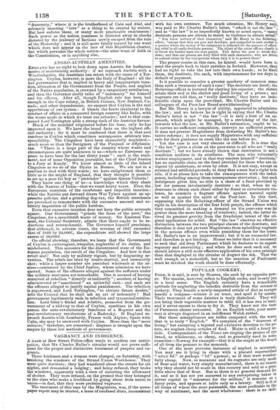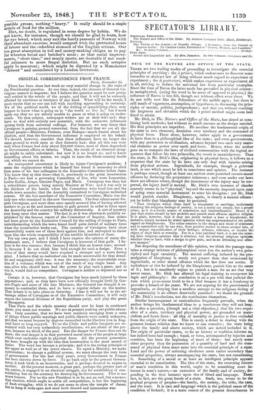POPULAR COOKERY.
FOOD, it is said, is sent by Heaven, the cook by an opposite pow- er. The maxim, however, refers to English cooks, and is only just in a local sense. The English certainly have a remarkable aptitude for neglecting the benefits derivable from the science of cookery. They handle a newly-imported article of diet as savages handle a compass—admire it on trust, and spoil it by misuse. Their treatment of some dainties is truly diabolical. They will not bring their vegetable marrow to table till it has run to seed; and it never occurs to them to fry it. They know not the taste of Parmesan cheese untoasted. At an English table, your maca- roni is always disguised in an indifferent Welsh rabbet. But these misappliances are trifles compared with the waste that is so truly " English." We complain of the "dearness of living," but excepting a bigoted and exclusive devotion to the po- tato, we neglect cheap articles of food. Maize is still a fancy ar- ticle. Correspondents of the Times are singing the praises of rye bread, so wholesome, so cheap, and so generally used in some countries—Norway for example—that it is the staple at the board of all from the peasant to the monarch. One of the most perverse instances of neglect is macaroni. You may see it lying in shops with a placard superscribed "ONLY 8d." or perhaps "7d." a pound ; as if that were wonder- fully cheap. Now, as macaroni and its cognates are only made of flour and water, very simply manufactured, there is no reason why they should not be made in this country and sold at a price little above that of flour. But as there is no general demand for it, and as it has not yet occurred to any enterprising baker to invest capital in "macaroni for the million," it remains at a fancy price, and appears at table only as a luxury. -Still is it of all forms of wheat the most palateable, the most profitable in the way of nutriment, and the most wholesome : there is no inch-
gestible grease, nothing "heavy." It really should be.a staple article of food for the million.
Diet, no doubt, is regulated in some degree by habits. We do not know, for instance, though we should be glad to learn, how far rye bread, which may suit the hardy peasants of Norway with their abundant exercise, would comport with the protracted hours of labour and the enfeebled stomach of the English artisan. Our too great absorption in toil and money-making obliges us to pay for wheaten bread and butcher's meat ; so that social improve- ments, "short time," and manly sports, are desirable if not need- ful adjuncts to more frugal dietetics. But no such scruples apply to macaroni; which might be digested by a Manchester " dresser " and assimilated by a London litterateur.



























 Previous page
Previous page